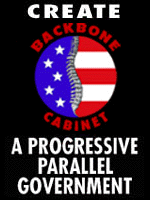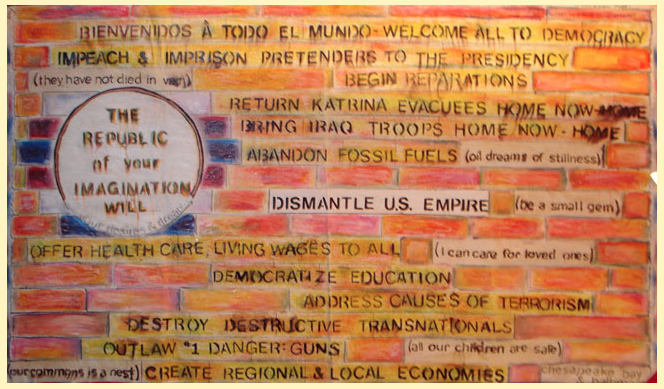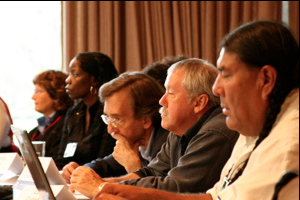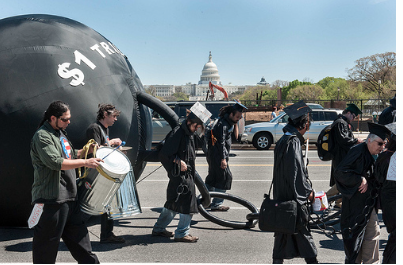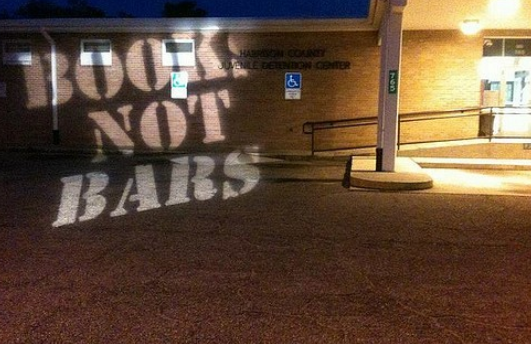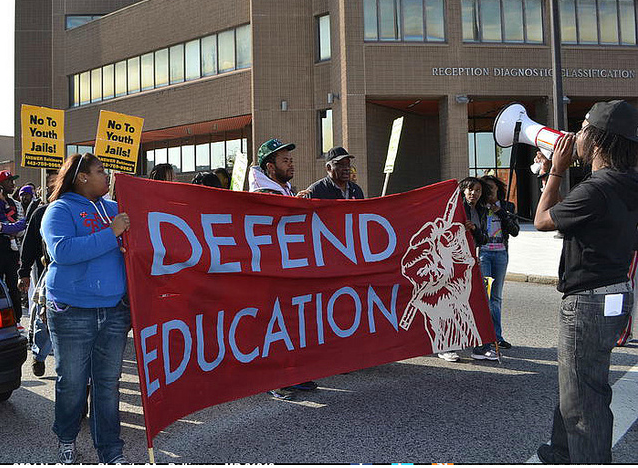From 2005 to 2013, I co-hosted a podcast for a Progressive Cabinet Project. See some of our87 archived interviews for our ‚ÄėConversations with the Cabinet‚Äô.¬†
HERE’s a brief video description  from 2007 (starts at 4 minutes) of our Progressive Cabinet Project.
By Diane Wittner, May 2008
Transcript from conference speech in Radford, Virginia about using a progressive gov’t structure for strategy, to pursue justice and WINS, across groups, issues, and, in election season, among political parties ‚Äď progressive democrats and independents.
As a former resident of the U.K., I had grown accustomed to robust debates about real policy alternatives. And I had left the Democratic Party in the wake of the first stolen election in 2000, and had begun to contact media and political progressives, requesting, amongst other things, a roundtable discussion on forming a shadow government. As the Backbone Campaign had also independently already begun creative research on a unified set of progressive policy alternatives, we joined forces. Our outstanding team also included: co-host and Backbone Director Bill Moyer, Sound Engineer Roger Fulton and others.
Our objectives were bold: To model progressives moving from protest to policy, to demonstrate that progressives have a unified vision for government, to define the specific policies needed, and to introduce leaders to people around the country. We used new technology and unusual partnership to be our own media, and to invite anyone around the country to participate.
Our Progressive Cabinet Project articulated a solution-oriented unified policy agenda for government and for social movement building beyond class, race, culture and gender inequities, political party constraints, election cycles, and corporate media blackouts.
In this¬†social sculpture,¬†all participants constructed our media¬†and¬†our message. Our project was a creative experiment in systems design & cross country collaboration, research and new media ‚ÄĒ all for ecosystem sustainability, justice, fairness, and democracy.
Our online tools for the nomination process were available to anyone with internet around the country. As an evolving and listening team, we identified, researched, and interviewed progressive policy experts, our ‚Äėnominees‚Äô for executive branch cabinet positions. We examined domestic and foreign policy, and our Conversations often pioneered new paradigm thinking.
We created a Department of Peace, the position of Secretary of Sustainability, and we repeatedly explored other big changes needed ‚Äď ¬†renewable energy instead of fossil fuels, housing & quality education for all, moving taxpayers‚Äô dollars from war to domestic needs, and greater bioregional governance.
Some of our outstanding nominees:
- White Earth Land Recovery Project‚Äės Winona LaDuke for Secretary of the Interior
- BALLE and White Dog Cafe’s  Judy Wicks for Secretary of Sustainability
- Black Women’s Health Imperative founder Byllye Avery for Secretary of Health and Human Services
- Farm Labor Organizing Committee President Baldemar Velasquez for Secretary of Labor
- Visionary architect and designer Christopher Alexander for HUD Secretary. See Conversation transcript
Some of our podcast’s big ideas are now part of the national conversation. Just three examples:
1. In 2007, we hosted two Health Care for All ¬†or ‚Äėsingle payer‚Äô Conversations before it became a hot topic.
2. In 2011 and 2012 we conducted two Conversations on free public higher education with outstanding stakeholder panelists.
3. In 2013, we were honored to host Conversations on restorative justice and healing with a much-needed twist, those most impacted in charge:  family and youth-led Youth Justice Reinvestment.
In 2007, we held a Progressive Cabinet Summit in Atlanta at the first ever U.S. Social Forum, with over 40 of our Progressive Cabinet nominees.  (above photo features Tom Goldtooth, Steve Cobble, Luis Cuevas, Holly Sklar and others.) Adrienne Marie Brown was our kind facilitator, and Spanish translation was offered. Here’s a video report by Liberty News TV,  our event brochure, our press release, announcement article, and my follow-up article.
Progressive Cabinet Nominee for  Secretary of Peace and Secretary of Education, Howard Zinn even endorsed our Summit
Eventually our objectives and approach evolved. Our podcast became a virtual listening platform designed to support, and spread the word about, stakeholder-led campaigns.
Our online discussions were followed by three practical forms designed to further connect people for moving forward immediately on an issue: comprehensive resource pages, community-based workshops, and street actions.
Final highlights:
2011 Credit Union Organizing Podcast and Resource Page
2011 Eviction Protection Podcast and Resource Page
2012 Student Debt Jubilee/Free Higher Education Two Podcasts and Resource Page
2013 Youth Justice Reinvestment: Reversing the School-to-prison Pipeline:
Part One: Family-led Solutions to Youth Injustice
Part Two: Youth-led Solutions to Youth Injustice
Co-produced with Justice 4 Families Grace Bauer and Ella Baker Center’s Zachary Norris. This two-part podcast featured: Justice For Families, Youth Justice Coalition, Baltimore Algebra Project, Friends and Families of Louisiana’s Incarcerated Children, Families and Allies of Virginia’s Youth, Albert Cobarubbias Justice Project, Campaign to end the New Jim Crow, and more. (Photo credits: Backbone Campaign & Baltimore Algebra Project)
‚ÄúFor decades, California and the nation have responded to nearly every problem in our classrooms and communities with police and prisons. These efforts have pushed millions of students out of school, and led to the mass incarceration of youth and our families. Public policies have also disproportionately targeted Black and Brown youth, contributing to severe racial injustice in our educational and court systems. A growing movement led by youth and families is demanding a new investment in public safety ‚Äď one that prioritizes COLLEGE PREP NOT PRISON PREP!‚ÄĚ ‚Äď Youth Justice Coalition
Black Lives Matter ‚Äď At School, Too ‚Äď Nation Magazine article from 2015 by George Joseph, featuring Baltimore Algebra Project

